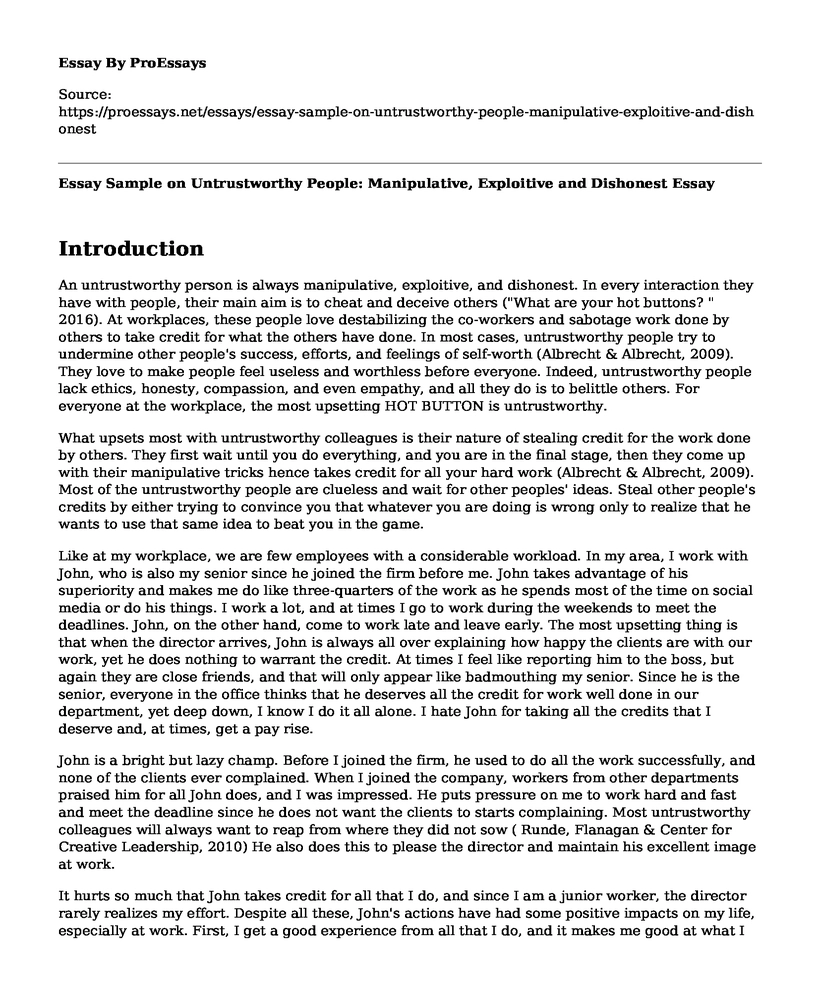Introduction
An untrustworthy person is always manipulative, exploitive, and dishonest. In every interaction they have with people, their main aim is to cheat and deceive others ("What are your hot buttons? " 2016). At workplaces, these people love destabilizing the co-workers and sabotage work done by others to take credit for what the others have done. In most cases, untrustworthy people try to undermine other people's success, efforts, and feelings of self-worth (Albrecht & Albrecht, 2009). They love to make people feel useless and worthless before everyone. Indeed, untrustworthy people lack ethics, honesty, compassion, and even empathy, and all they do is to belittle others. For everyone at the workplace, the most upsetting HOT BUTTON is untrustworthy.
What upsets most with untrustworthy colleagues is their nature of stealing credit for the work done by others. They first wait until you do everything, and you are in the final stage, then they come up with their manipulative tricks hence takes credit for all your hard work (Albrecht & Albrecht, 2009). Most of the untrustworthy people are clueless and wait for other peoples' ideas. Steal other people's credits by either trying to convince you that whatever you are doing is wrong only to realize that he wants to use that same idea to beat you in the game.
Like at my workplace, we are few employees with a considerable workload. In my area, I work with John, who is also my senior since he joined the firm before me. John takes advantage of his superiority and makes me do like three-quarters of the work as he spends most of the time on social media or do his things. I work a lot, and at times I go to work during the weekends to meet the deadlines. John, on the other hand, come to work late and leave early. The most upsetting thing is that when the director arrives, John is always all over explaining how happy the clients are with our work, yet he does nothing to warrant the credit. At times I feel like reporting him to the boss, but again they are close friends, and that will only appear like badmouthing my senior. Since he is the senior, everyone in the office thinks that he deserves all the credit for work well done in our department, yet deep down, I know I do it all alone. I hate John for taking all the credits that I deserve and, at times, get a pay rise.
John is a bright but lazy champ. Before I joined the firm, he used to do all the work successfully, and none of the clients ever complained. When I joined the company, workers from other departments praised him for all John does, and I was impressed. He puts pressure on me to work hard and fast and meet the deadline since he does not want the clients to starts complaining. Most untrustworthy colleagues will always want to reap from where they did not sow ( Runde, Flanagan & Center for Creative Leadership, 2010) He also does this to please the director and maintain his excellent image at work.
It hurts so much that John takes credit for all that I do, and since I am a junior worker, the director rarely realizes my effort. Despite all these, John's actions have had some positive impacts on my life, especially at work. First, I get a good experience from all that I do, and it makes me good at what I do. For a few years, I have spent in that company. I have learned a lot, and I believe I am competent enough in my profession. The workload that I handle has hardened, and I am sure when I get a job in another company, I will find things more manageable, especially if I find a considerate boss who appreciates my efforts.
Conclusion
All my life, it never occurred to me that there people who wait for someone to work, and then they take credit for it. Since I was young, I always knew that people should work hard for everything and earn from their sweat what we do no longer speak for itself in the todays world ("How to Respond When Someone Takes Credit for Your Work," 2015). Working with John has made me learn a lot about people, especially our seniors at work, and this will help in dealing with my future colleagues. I will have to stand for myself and speak out to prevent emotional torture and suffering as well as suffering in the hands of my superior.
References
Albrecht, W. S., & Albrecht, W. S. (2009). Fraud examination. Mason, OH: Cengage Learning South-Western.
How to Respond When Someone Takes Credit for Your Work. (2015, April 29). Retrieved from https://hbr.org/2015/04/how-to-respond-when-someone-takes-credit-for-your-work
Runde, C. E., Flanagan, T. A., & Center for Creative Leadership. (2010). Developing your conflict competence: A hands-on guide for leaders, managers, facilitators, and teams. San Francisco: Jossey-Bass.
What are your hot buttons? (2016, November 14). Retrieved from https://www.conflictdynamics.org/what-are-your-hot-buttons/
Cite this page
Essay Sample on Untrustworthy People: Manipulative, Exploitive and Dishonest. (2023, Mar 27). Retrieved from https://proessays.net/essays/essay-sample-on-untrustworthy-people-manipulative-exploitive-and-dishonest
If you are the original author of this essay and no longer wish to have it published on the ProEssays website, please click below to request its removal:
- How Can We Develop More Programs to Encourage Students to Participate in Sports?
- Research Paper on Gun Violence in Our Society
- Essay Sample on the Views of Aristotle, Kant's Deontological Moral Theory and Mill's Utilitarianism
- Formal vs Informal Groups: Distinguishing With Examples - Essay Sample
- Essay on Cross-Cultural Communication in Romantic Relationships: A Study of Early Stages
- Essay on 80% of My Day Spent in Communication: The Importance of Effective Interaction
- Essay Example Congenital Muscular Dystrophy: A Rare, Heterogeneous Neuromuscular Disorder







